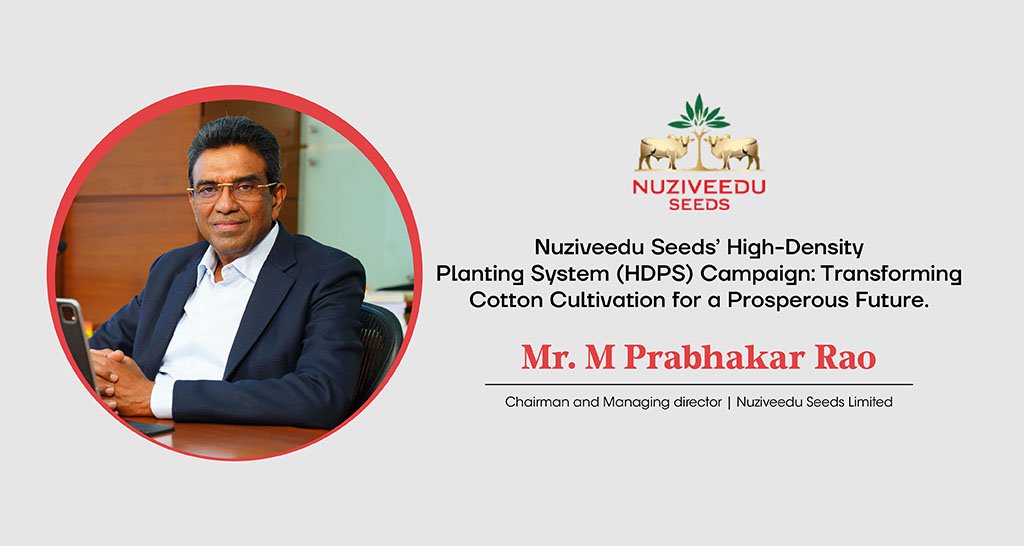Nuziveedu Seeds Limited (NSL) has been at the forefront of agricultural innovation, spearheading a decade-long journey to revolutionize Cotton farming through High-Density Planting Systems (HDPS). This breakthrough technology is meticulously tailored to optimize plant population and spacing for specific soil types, unlocking unprecedented productivity levels and enhancing farmer profitability. By combining advanced genetics with scientific agronomic practices, NSL is redefining the Cotton cultivation landscape in India.
Empowering Farmers through Philanthropic Initiatives:
In Kharif 2024, NSL demonstrated it’s commitment to the farming community through a philanthropic initiative that set a new benchmark in Agricultural outreach. The company executed 8,200 demonstrations across 175 districts in six major Cotton-growing states, providing free access to it’s specialized HDPS Cotton hybrids. These demonstrations aimed to educate farmers on maximizing yields while minimizing resource inputs.
To ensure holistic support, NSL supplied free plant growth regulators (PGR) to help Cotton plants develop systematically. Moreover, pheromone traps were distributed to monitor and manage pink bollworm infestations, an enduring challenge for Cotton farmers. NSL’s hands-on approach also included extensive farmer training on HDPS recommended practices and the importance of pest management ensuring that each demonstration plot served as a live classroom for cutting-edge agricultural practices.
Scientific Validation of HDPS Benefits:
NSL’s dedicated team of agricultural professionals closely monitored all demonstration plots throughout the season, conducting professional crop-cutting experiments to validate the effectiveness of HDPS. These experiments consistently highlighted a significant yield advantage with HDPS plots demonstrating a 25-30% increase in yield compared to conventional planting systems. This productivity boost achieved through optimized plant density underscored the transformative potential of HDPS in enhancing farmer profitability.
Vision for Kharif 2025: Scaling New Heights:
Buoyed by the success of the 2024 initiative, NSL is poised to scale up it’s HDPS program significantly in Kharif 2025. The company plans to execute this program across more than 2 lakh acres in six states, cementing it’s role as a leader in advancing Cotton farming technology. This expanded outreach aims to create a ripple effect, driving sustainable growth in India’s Cotton industry while empowering farmers to achieve greater financial stability.
Paving the Way for Agricultural Mechanization:
HDPS technology is more than just an agronomic innovation; it represents a paradigm shift toward agricultural mechanization. By enabling uniform plant spacing and optimizing plant population, HDPS lays the groundwork for mechanical harvesting, addressing critical challenges such as labour shortages and high production costs. Additionally, the system’s emphasis on precision and cleanliness helps reduce plastic contamination, ensuring better-quality Cotton for downstream industries.
Driving Industry-Wide Collaboration through HDPS Clusters:
Recognizing the transformative potential of High-Density Planting Systems, the Government of India is promoting this concept through a cluster-based approach, which ensures widespread adoption and maximized benefits for all stakeholders. By cultivating Cotton using a single hybrid variety within a defined cluster, this initiative enables ginners and traders to obtain uniform fibre properties in sizable quantities, meeting the consistent quality demands of downstream industries. The availability of uniform, high-quality Cotton significantly enhances processing efficiency and fosters stronger linkages between farmers, ginners, and the textile value chain.
Traceability and Sustainability in Cotton Production:
The adoption of HDPS technology is paving the way for sustainable Cotton production, offering a unique opportunity for the textile industry to embrace code-based traceability systems. Fashions brands can now trace cotton from farm to fabric ensuring transparency and accountability throughout the supply chain—a key requirement in the era of conscious consumerism. Additionally, yarn and fabric manufacturers can leverage the consistent and superior-quality Cotton produced under HDPS to create sustainable and high-quality products, aligning with global demands for environmentally friendly and socially responsible textiles. By integrating HDPS into their sourcing strategies, these industries are poised to contribute significantly to a greener, more efficient Cotton value chain.
A Vision for India’s Agricultural Future:
As India’s agricultural sector evolves, HDPS stands out as a transformative force offering farmers a beacon of hope for a more prosperous future. Through it’s steadfast dedication to innovation, farmer education and sustainable practices, Nuziveedu Seeds is not just promoting a technology but pioneering a movement that has the potential to revolutionize Cotton cultivation in India.
NSL’s HDPS campaign exemplifies how cutting-edge agricultural technologies can drive growth, enhance productivity and empower farmers ensuring a brighter and more sustainable future for India’s Cotton industry.
